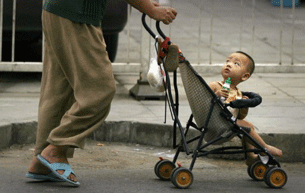Birth policy could destabilize China
| Publisher | Radio Free Asia |
| Publication Date | 23 September 2011 |
| Cite as | Radio Free Asia, Birth policy could destabilize China, 23 September 2011, available at: https://www.refworld.org/docid/4e8589e01f.html [accessed 1 June 2023] |
| Disclaimer | This is not a UNHCR publication. UNHCR is not responsible for, nor does it necessarily endorse, its content. Any views expressed are solely those of the author or publisher and do not necessarily reflect those of UNHCR, the United Nations or its Member States. |
2011-09-23
Family planning officials brutalize women, demolish homes.
 A baby looks up at his mother on a street in Beijing, Aug. 25, 2007. AFP
A baby looks up at his mother on a street in Beijing, Aug. 25, 2007. AFP
China's strictly enforced One-Child Policy has led to increased gender discrimination and violence and could destabilize the world's most populous country, experts warned this week at a U.S. congressional hearing.
Chinese authorities have also become more "brutal" in implementing the controversial three-decade-old one-child-per-couple law, fueling abortions and increasingly skewing birth sex ratios in favor of males due to the traditional Chinese preference for a son, the experts testified.
This has led to millions of girls being "culled" from the population through abortion, said Brigham Young University political scientist Valerie Hudson, speaking on Thursday at a hearing called by the House of Representatives Foreign Affairs subcommittee on human rights.
And for each of these girls, someone else's son will become "surplus" or unmarried – "or in colloquial Chinese, a 'bare branch on the family tree,'" Hudson said.
By 2020 the number of these unmarried young men will be in excess of 30 million, or approximately one in every five young Chinese men, Hudson said, adding that it will be mainly young men without the advantages of education, skills, or money – a group already "aggrieved with the existing social order" – who will find themselves unable to form families.
This will lead to an unstable China "marked by increases in crime, violent crime, crimes against women, substance abuse, and the formation of gangs that profit from these behaviors," and to meet this challenge, China will likely become "more authoritarian," Hudson said.
And in the future, Hudson added, a more "masculinized" China could be susceptible to political campaigns focused on national pride and hostility toward competing nations.
Broken lives
China's growing gender imbalance is also "a powerful, driving force behind trafficking in women and sexual slavery from nations surrounding China," said human rights advocate Reggie Littlejohn.
She pointed to the broken lives already resulting from the increased levels of violence used in enforcing the One-Child Policy, which the Chinese authorities claim has prevented about 400 million births.
Littlejohn's California-based group Women's Rights Without Frontiers has documented abuses under the policy in a Sept. 22 report, "China's One Child Policy: New Evidence of Coercion."
"In this report, we have cases of forced abortion – one woman at eight months and another woman forcibly aborted with twins at eight-and-a half months.... There's a woman here who missed [an official] pregnancy check, and her own relatives were forced to demolish her home," she said.
In other cases, Littlejohn said, a man was "smashed in the head" and left permanently disabled after his wife gave birth to a second child, and another man was beaten to death because his son's wife was suspected of an unauthorized birth.
"These things happen with impunity," Littlejohn said.
"People are not prosecuted, they've not held accountable. I would really say that the spirit of the Red Guards lives on in the Family Planning Police."
A Chinese woman who once worked in a state-owned textile factory where the One-Child policy was strictly enforced said at the hearing that she had been forced to have five abortions.
"When discovered, pregnant women would be dragged to undergo forced abortions – there simply was no other choice," said the woman, using the pseudonym Liu Ping.
"We had no dignity as potential child-bearers."
"I am simply one of these many women whose lives were destroyed by the policy," said Liu, who has since emigrated to the United States.
Reported By Richard Finney.
Link to original story on RFA website
